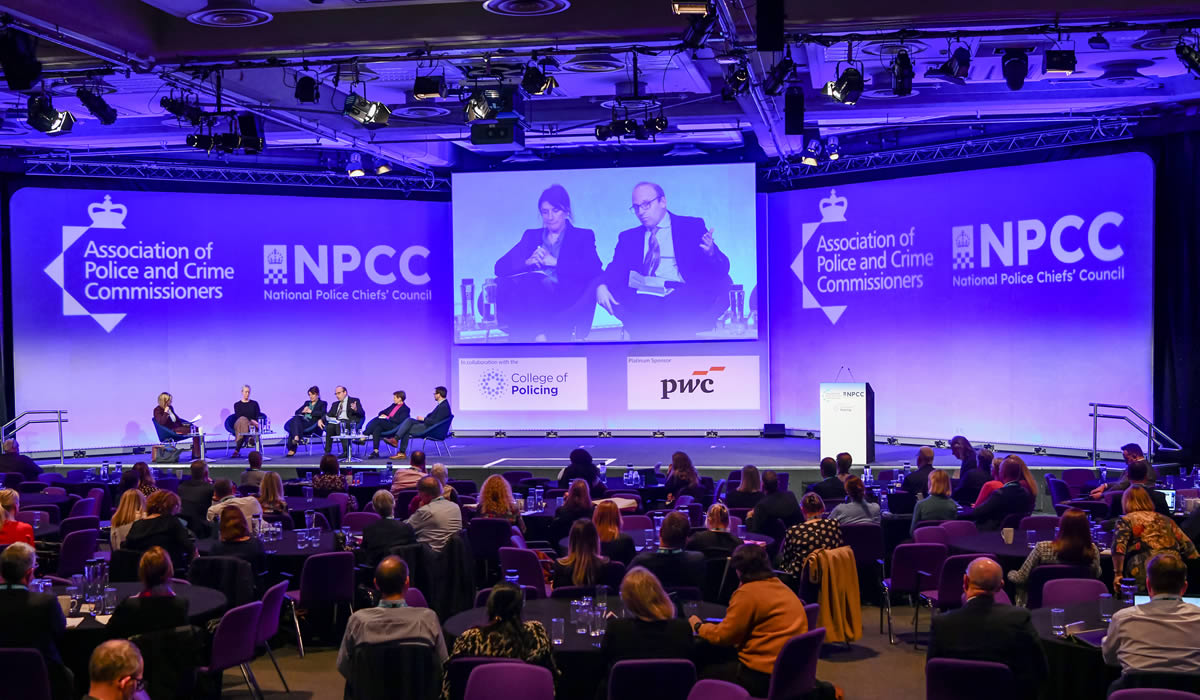*this programme will be updated as we get closer to the event.
Day 1: Tuesday 18th November |
|
| 08.00 | Registration, refreshments and exhibition |
| 09.00 | Welcome to the Summit from the Chair, Julie Etchingham. |
| 09.05 | Introduction NPCC and APCC chairs welcome people to the Summit and set out the key challenges and opportunities over the next year and beyond. |
| 09.45 | Plenary session: Policing landscape 2025 The Government is due to set out a programme of police reform to modernise the way the service is structured, funded and governed. However, budgets are tight, as the Spending Review has made clear, while there is no let up on demand on the workforce. |
| 11.00 | Refreshment break, networking and exhibition |
| 11.30 | Keynote speaker |
| 12.15 | Plenary session: Shocks and risks Overseas conflicts, climate change, shifts in global politics and society’s growing dependency on digital communications mean the need for robust civil contingency plans and cyber security has arguably never been greater. What are the main risks facing the UK, what measures are in place to protect the country and what role can policing play? Followed by a panel discussion. |
| 13.15 | Lunch, networking and exhibition |
| 14.15 | Breakout groups - Panel discussions with key figures from policing, criminal justice, and the private sector Breakout - AI and tech - what works? Six examples of innovative programmes and good practice on the use of digital technology and AI are presented at tables in the Churchill Room. Summit delegates move around from table to table, ‘speed dating’-style, with a bell sounding every 15 minutes. Delegates will have the opportunity to view four of six of these exciting and innovative programmes.Breakout - Measuring up What are the most effective ways to improve police performance, raise standards, and build public trust in policing? Across the system, multiple agencies already monitor how police operate and assess their effectiveness, but how reliable are these measures and what do they really tell us about the state of policing? As part of this wider landscape, the Home Office has recently established the ‘Police Standards and Performance Improvement Directorate’ to provide a more data-rich picture of force performance. How can it complement or challenge existing approaches and how can it succeed in capturing what really matters? sponsored by Breakout - Safer streets: the compelling case that neighbourhood policing cuts crime and builds trust Uncover the compelling evidence that reveals why effective neighbourhood policing is absolutely essential for communities and forces alike. Hosted by the College of Policing, join an eye-opening panel discussion where leading experts from policing, government, and partners debate the compelling evidence behind effective neighbourhood policing. Experience how this evidence-based, trust-building approach slashes demand, cuts crime and transforms community safety. This isn't theory - it's proven success backed by robust evidence. Essential insights for everyone committed to creating safer streets through approaches that deliver measurable results for communities and businesses. |
| 15.30 | Refreshment break, networking and exhibition |
| 16.00 | Plenary session: Justice served Sweeping changes are coming to the criminal justice system, following two landmark reviews by former Justice Secretary David Gauke and retired Court of Appeal judge Sir Brian Leveson. Will the reforms get the wheels of justice moving more quickly? And what will the impact be on policing? |
| 16.40 | Plenary session: Safe online How is the Online Safety Act and other legislation on data protection and privacy working? |
| 17.40 | Wrap up & close of day 1 The Chair, Julie Etchingham, wraps up the day and looks ahead to the drinks reception, dinner and speaker. |
| 18.30 | Drinks reception - Pickwick Suite |
| 19.30 | Dinner With guest speaker, Sam McAlister |
Day 2: Wednesday 19th November |
|
| 08.00 | Registration, refreshments and exhibition
Summit facilitated by Julie Etchingham |
| 09.00 | Welcome back Julie Etchingham welcomes people back to the Summit and looks ahead to the day. |
| 09.05 | Plenary session: Victims’ voice Two crime victims tell us how they have overcome adversity, what they learned from their experiences and how the police can help people in similar situations. |
| 09.40 | Plenary session: Getting to 50 per cent How is policing going to work towards the government’s target to reduce violence against women and girls? |
| 10.15 | Refreshment break, networking and exhibition |
| 10.45 | Breakout - Free to speak? Where does free speech end and police action begin? A series of cases involving inflammatory social media posts and the spread of misinformation have raised questions about government guidance on non-crime hate incidents, police decision-making, and the laws on contempt of court. Breakout – Performing under pressure What do police leaders need to do to maintain standards, keep ahead of their work - and stay fit and healthy, in body and mind? Breakout - After Encrochat Five years ago, the National Crime Agency, supported by local forces, launched Operation Venetic, after the Encrochat code had been cracked. It has led to 3,000 arrests and 1,200 convictions. What has the impact been on serious organised crime, what has law enforcement learned about investigating and prosecuting organised criminals - and how can police and other agencies capitalise on the successes? |
| 12.00 | Plenary session: Beyond Prevent What are the lessons from the Southport attacks for the Prevent programme? What support and interventions are needed for those who don’t fall under the Prevent umbrella? And how should policing, the education sector and other agencies identify and deal with young people at risk of carrying out acts of mass violence? |
| 13.00 | Keynote speaker |
| 13.30 | Summary and Julie Etchingham closes the Summit Julie Etchingham closes the Summit with final remarks from Gavin Stephens and Emily Spurrell. |
| 13.40 | Lunch, networking and exhibition |
*Programme and speakers may be subject to change.




